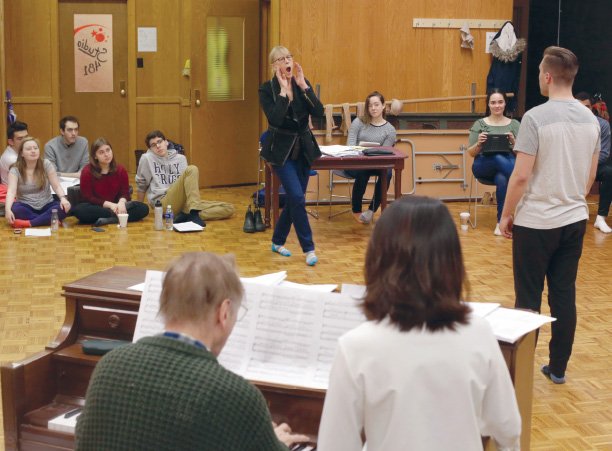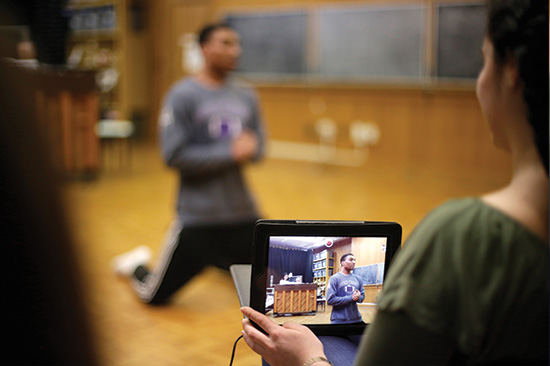
The 12 students in Theatre Professor Lynn Kremer’s Voice in Acting class are all shoeless, having a pillow fight.
Standing in a circle, they’re tossing a pillow from one student to another, shouting a sentence with each throw.
“They throw the pillow to someone and say their high-intensity line,” Kremer says to me as an aside. “It gets them to physicalize and release energy, so they don’t get too tight.”
The lines are from pieces of text that they will perform for the class in a workshop setting throughout the semester, in addition to two songs. A group of three stages a scene from the Tony Award-winning play “August: Osage County” with Kremer giving them cues and reminders as they go.
“Take a breath, don’t get too tight.”
“Stay in the moment.”
“Play an objective.”
I can follow along with breathing and staying in the moment, but playing an objective is where this theatre-goer gets lost.
I’ll let Kremer explain:
“An objective is what the actor or singer/actor wants, and the tactics are how you achieve the objective. Both objectives and tactics need to be verbs. Verbs like cajole, plead, threaten, test and guilt are all good and keep the performer engaged and focused on what they are doing as opposed to how they are performing. If you worry about the how, you become self-conscious … The tactics help with phrasing, connection to lyrics and overall performance, because the students have something active to strive for.”
Playing the objective allows the students to focus on the motivations of their characters, but they also pay attention to movement. Each student practiced one of their two songs for the semester, accompanied by a pianist.
Kremer also has her shoes off, the easier to float around the room while offering commentary. As she advises a student to add some dance moves to her performance of “All That Jazz” from the musical “Chicago,” Kremer dances herself, saying, “do it à la Catherine Zeta-Jones!”
There is rarely a moment when Kremer wasn’t in motion — she offers hands-on adjustments to each student, moving their jaw or shoulders into position for a better-delivered note or line. When one student needs to relax his forehead during the song, Kremer simply places her hand there as a reminder. Each adjustment she calls out or demonstrates has an almost magical effect, helping students hit the desired notes.
For nearly two hours, the students practice being open and vulnerable, taking constructive feedback from both Kremer and their peers. Not only will their scenes and songs be better for it, Kremer says, but they’ll see benefits off the stage as well.
“It doesn’t matter what your discipline is — we all need to use our voices, and it is important to learn how to use your voice in a healthy way so you can use it for your entire life,” Kremer says. “While I teach the class in an intensive, conservatory-like manner, learning how to use your voice healthily covers all aspects of life, because we speak all the time.”
 Martin Dorsey ’19 performs a piece from “Shrek The Musical” while his partner recorders for later analysis
Martin Dorsey ’19 performs a piece from “Shrek The Musical” while his partner recorders for later analysisCourse Catalog
THEA-202: Voice in Acting
Department: Theatre
Description: Develop your voice for both acting and public speaking, using breath, projection and articulation.
Meeting Times: Tuesday and Thursday, 11 a.m. – 12:50 p.m.
Classroom: O’Kane Hall, Room 481
Required Reading: “On Singing on Stage” by David Craig and “Voice: Onstage and Off” by Robert Barton
Tools of the Trade: Voice and an iPad or phone to record performances and analyze them with a partner
Assignments:
- Four performance exams: two of texts and two of songs
- Two written vocal analyses, plus one each written song and text analysis based on the textbooks
- Quizzes and iPad recordings
- Performance
- Final exam
Grades: Attendance and assignments, based on improvement and not talent
Prerequisites: Basic Acting; open to non-theatre majors
About the Professor
Kremer, professor of theatre and The Rev. John E. Brooks, S.J., Chair in the Humanities, has taught Voice in Acting at Holy Cross since 1984. She is also the director of Arts Transcending Borders and teaches courses in acting, voice and performance traditions of Asia, as well as CreateLab, inter-disciplinary courses co-taught by six professors that investigate real world problems through hands-on, collaborative projects. She has been at the College since 1983 and is active as a director both on campus and in the theatre world. Read more about Professor Kremer at holycross.edu/hcm/kremer.
See more photos from this class in a web exclusive at magazine.holycross.edu.
Written by Maura Sullivan Hill for the Summer 2017 issue of Holy Cross Magazine.
About Holy Cross Magazine
Holy Cross Magazine (HCM) is the quarterly alumni publication of the College of the Holy Cross. The award-winning publication is mailed to alumni and friends of the College and includes intriguing profiles, make-you-think features, alumni news, exclusive photos and more. Visit magazine.holycross.edu/about to contact HCM, submit alumni class notes, milestones, or letters to the editor.